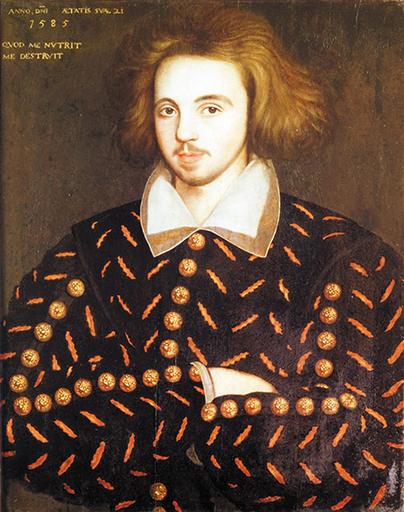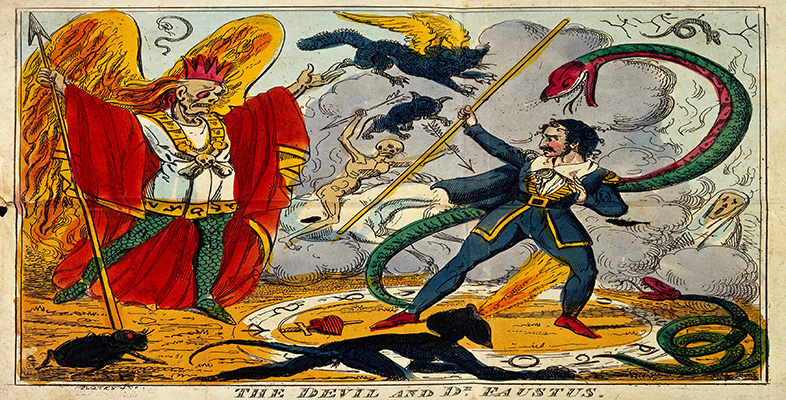1 Christopher Marlowe
1.1 Marlowe: the man

In this course I will discuss the question of reputation in relation to a literary text, Doctor Faustus by Christopher Marlowe, which was written sometime between 1588 and 1592 and was first published in 1604 (the A text). We will start by considering the literary reputation of Marlowe (1564–93), who lived and wrote at the same time as Shakespeare and is probably the most famous of his many gifted fellow writers.
We will then look at Doctor Faustus, Marlowe's most well-known play. The main aim being to introduce you to the study of literature at undergraduate level. We will discuss several aspects of the play, and engage in some of the main skills and techniques involved in the analysis and interpretation of literary texts.
Let's begin by looking at the life and reputation of the play's author.
Marlowe's touch was in my Titus Andronicus, and my Henry VI was a house built on his foundations … I would give all my plays to come for one of his that will never come.
These lines come from John Madden's 1998 film Shakespeare in Love. Shakespeare, played by Joseph Fiennes, has just heard that Marlowe has been stabbed to death in a tavern in Deptford and believes, mistakenly, that he is responsible for his death. Stricken with guilt and grief, he acknowledges the immense artistic debt he owes his great contemporary, without whose works he feels he could never have written two of his own early plays.
This scene from the film gives us a reasonably accurate picture of the kind of reputation that Marlowe now enjoys as a writer: he is seen both as an important dramatist in his own right, and as a pioneer whose achievements on the stage made possible the considerable accomplishments of his successors, most especially the plays of Shakespeare. What Shakespeare in Love only hints at in its mention of Marlowe's sticky end is that he is as famous for his life and death as for his works.
Marlowe's posthumous literary reputation was heavily influenced by several hostile contemporary accounts of his character and beliefs. His fellow playwright Thomas Kyd accused him of holding a variety of ‘monstrous opinions’, of being ‘intemperate’ and of having ‘a cruel heart’ (Maclure, 1979, pp. 35, 33), though it's important to realise that Kyd made these claims under torture. The spy Richard Baines, who had already informed on Marlowe during the counterfeiting affair, submitted a report to the authorities which portrayed him as a scoffer and heretic who, for example, mocked religion as a tool used by the powerful ‘to keep men in awe’ and said ‘Christ was a bastard and his mother dishonest’ (ibid., p. 37). Baines also accused Marlowe of what we would call homosexuality (the word did not exist in the sixteenth century, though buggery was punishable by death) when he attributed to him the view that ‘all they that love not tobacco and boys were fools’ (ibid., p. 37). The puritan Thomas Beard charged Marlowe with ‘atheism and impiety’, with denying ‘God and his son Christ’ (ibid., p. 41). He also interpreted Marlowe's violent death as God's judgement upon his sins, or as Beard put it rather more colourfully, as the ‘hook the Lord put in the nostrils of this barking dog’ (ibid., p. 42). It's only fair to add that Marlowe was also admired and celebrated as a poet and dramatist during and immediately after his lifetime; for example, fellow dramatist George Peele called him ‘the Muses' darling’ (ibid., p. 39), while another playwright, Thomas Heywood, writing in 1633, described him as ‘the best of poets in that age’ (Cheney, 2004, p. 3).
Given such spectacular biographical material, it's not surprising that Marlowe the man has always been as famous as Marlowe the writer. Moreover, the correlations between the work and the life (both the facts and the gossip) are undeniably striking: all of Marlowe's dramatic protagonists are in some significant sense rule-breakers, who challenge religious, political or sexual orthodoxies, much as he was accused of doing. Two of his most well-known heroes, Tamburlaine and Doctor Faustus, share with their creator their rise from low-class origins to fame and success, while another protagonist, King Edward II, is sexually infatuated with his favourite Piers Gaveston.
Marlowe's literary reputation has depended to a considerable extent on how different historical periods have viewed his life and his unconventional protagonists. Those critics in the eighteenth century who had some knowledge of Marlowe were generally scandalised by the biographical accounts that survived and repelled by what they perceived to be the intemperate nature of his protagonists. It was not until the nineteenth century that a more favourable view of Marlowe's artistic accomplishments began to emerge. The establishment of English Studies as a distinct academic discipline in the second half of the nineteenth century brought with it the construction of a canon of great writers and a history of English literature which accorded Marlowe the crucial groundbreaking role he plays in Shakespeare in Love.
Changing views of the artist consolidated his integration into the literary canon. Viewed in the light of the biographies of romantic poets like Shelley (1792–1822), an avowed atheist, and Byron (1788–1824), surrounded through much of his career by sexual scandal, Marlowe's tumultuous life and early death, along with his sensational plays, began to look less like culpable immorality and more like evidence of poetic genius. As the figure of the artist became increasingly associated with rebellion and excess, so the life and work that once disqualified Marlowe from literary celebrity came virtually to guarantee it.
